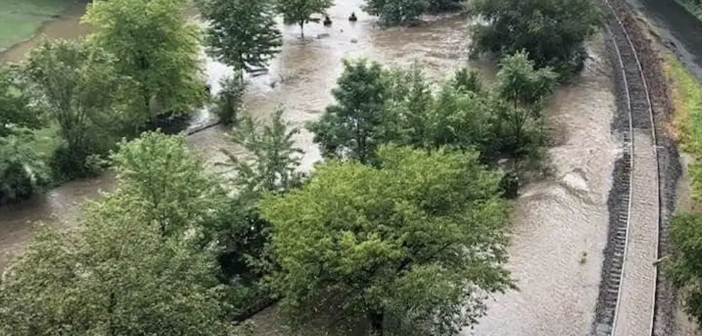In order to control flooding and improve water quality, the City of Bethlehem has decided to implement a storm weather utility fee, following in the footsteps of Allentown and Easton which have implemented a similar measure.
Matt Dorner, deputy director of public works, said Bethlehem received a new stormwater permit from the state that required it to make changes to the current stormwater infrastructure. Many of these changes involve reducing the amount of sediment that gets into the water and roads.
The money provided from the stormwater fee will be used for a variety of projects to benefit the city. This includes increasing the amount of street sweeping and cleaning out sediment from inlets, Doner said.
Bethlehem is subject by the state to follow a permit known as a Municipal Separate Storm Sewer System (MS4), which imposes mandates for the city to prevent pollution and reduce already existing pollution.
Paul Grella, MS4 coordinator, explained how MS4 operates for cities like Bethlehem.
“There are six minimum control measures that essentially create a program for municipalities such as Bethlehem to try to move their environmental initiatives forward with respect to stormwater management,” Grella said.
As part of MS4, cities are required to implement a stormwater ordinance that follows certain criteria, he said.
Paul said all requirements of MS4 benefit the municipality.
“The goal here is really to clean up our waterways and increase the quality of life,” Grella said.
The City of Bethlehem website states that implementing this ordinance will fairly distribute the costs of stormweather services. In addition, all revenue will be placed into a special fund that can only be used for stormweather needs.
Currently, Bethlehem faces several problems due to stormwater, said Meara Hayden, the stormwater engineer for the city.
“A lot of the infrastructure is very old. Some pipes are cracking and leaking and catch basins are collapsing, which causes flooding and issues with the streets,” Hayden said.
She said there is a need for more stormwater retention basins and improvements to the ones the city already has. If not caught in basins, Hayden said stormwater will come flooding down to the city due to how it is situated.
Hayden said these changes in infrastructure will decrease the amount of flooding as well and serve to better the city.
Doner said it is the cost of these projects that pushed them into implementing the stormwater fee.
“People might not think about it everyday but improvement of water quality, the creeks and rivers is a benefit to all,” Dorner said. “You might not think about it everyday but it is real.”






Comment policy
Comments posted to The Brown and White website are reviewed by a moderator before being approved. Incendiary speech or harassing language, including comments targeted at individuals, may be deemed unacceptable and not published. Spam and other soliciting will also be declined.
The Brown and White also reserves the right to not publish entirely anonymous comments.
1 Comment
This fee was one of the banes of my existence in my railroad career. The fee is assessed by the parcel and is generally dependent upon the area of impervious material (paving, buildings et al) on it. Due to the manner in which data is collected and interpreted, one may end up paying fees on other peoples property. Checking is not a problem if you own a home but if you own thousands of parcels that are vaguely described, it becomes a staffing/administrative problem.
If you think about a major cause of the problem, roads; understand that “fairly distribute the costs of stormweather (sic.) services” is not going to happen because the owner of the roads does not pay it’s fair share.
This is another example of organizations being creative in obtaining more money. There is a legitimate need for dealing with stormwater and its effects. Interestingly Lehigh’s Day of Giving yesterday is also an example. Lehigh offers many donating choices for how much and to who, Bethlehem will not be so accommodating.